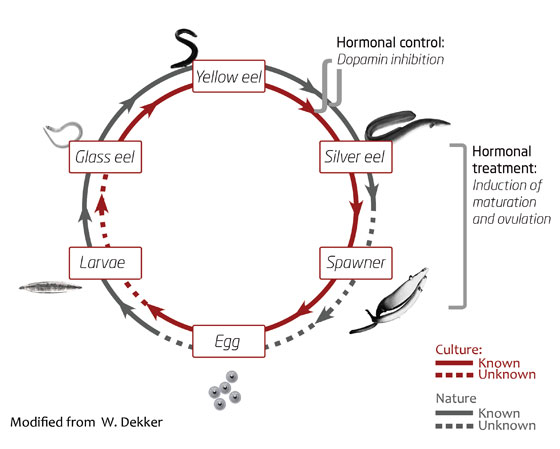The reproduction of eels in captivity has become an important research focus due to the severe decline of the natural stocks. However, many fish species do not reproduce in captivity and eels are among them. In the PRO-EEL project the eels therefore receive hormonal treatment to develop gametes and fertilization is made in vitro.
In wild eels, the development of ovaries and testes becomes inhibited by complex hormonal control mechanisms at the onset of their long spawning migration. When the eels approach the spawning area in the Sargasso Sea this inhibition must be released, however, the mechanisms responsible for cessation of the inhibition and continuation of the development are uncertain. It is due to this specific inhibition of development prior to migration that the eels do not mature naturally in European waters and in captivity.

The primary bottleneck in a controlled reproduction of eels concerns deficiencies in knowledge about their reproductive physiology and hormonal control. A challenge will therefore be to enhance methods applied to induce and finalise gamete development. The PRO-EEL team aims at introducing novel methods to meet these challenges, and in particular the new insight into hormonal control will be useful in development of maturation protocols. A self-sustained aquaculture builds on a broodstock from farmed production, which implies that the nutritional requirements of the female broodstock need to be adressed in order to produce healthy eggs and larvae.
In PRO-EEL, fish nutritional specialists at cooperate in the development of feed of the eels. Eel from different regions and traditions are basis of a comparative analyses among wild eels and farmed eels, which ranges from northern Norway to Tunisia in the south. Other challenges are the identification of suitable larval rearing conditions and initial feed for the larvae. A particularly critical issue in aquaculture is the step where larvae need to start feeding on their own. Determining suitable feed for the eels and establishing feeding cultures of larvae will be particularly challenging, because little is known about the feed of larvae in nature.
The establishment of first feeding and feeding cultures of larvae will be major breakthroughs in European eel research and an important and promising step towards a self-sustained aquaculture of the European eel. The long duration of the eel larval stage, i.e. the leptocephalus stage lasting one year or more however implies that production of glass eels will need further research on feed, ongrowing and culture techniques. However, the establishment of first feeding and feeding cultures of larvae will be a major breakthrough in European eel research and an important and promising step towards a self-sustained aquaculture of European eel.